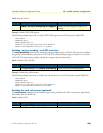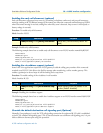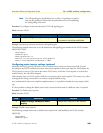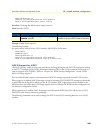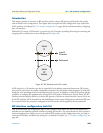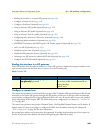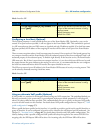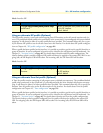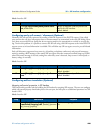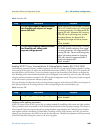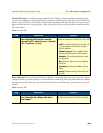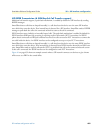
SIP interface configuration task list 444
SmartWare Software Configuration Guide 39 • SIP interface configuration
Mode: Interface SIP
Configuring a local host (Optional)
The local host parameter is used to build the host part of the From-Header-URI. Optionally, a port can be
entered. If no port has been specified, it will not appear in the From-Header-URI. This command is optional
in a SIP network setup where no DNS names are involved and only IP addresses applied. If no local host name
has been specified, the IP address of the outgoing IP interface will be taken as host part of the From-Header-
URI.
There are some exceptions where a local host name must be entered. One exception is if the bound gateway has
two transport interfaces and the From-Header-URI call outbound properties have been configured. Such a call
outbound property is the outbound proxy. To find the right identity in the location service, the From-Header-
URI must exist. But, if there is more than one transport interface, it is not clear which one will be used to send
the request because the proxy influences the routing. In such a case, it is recommended that the user configures
the local host name and knows which IP interface the request should be sent over.
The SIP server expects its own IP address in the From-Header-URI because of security or routing reasons. This
can be solved by manually entering a local host name.
Mode: Interface SIP
Using an alternate VoIP profile (Optional)
A VoIP profile is a container for all datapath-related settings on VoIP connections. The predefined default pro-
file exists persistently in the system and it is preconfigured with proper default parameters. It will always be
taken if no other profile has been specified. This command allows the user to specify an alternate VoIP profile
to use for all calls routed over this interface. For details about VoIP profile configuration see Chapter 47, “VoIP
profile configuration” on page 573.
When a profile has been specified on the interface, it is possible to provide a special one for specific identities or
group of identities. It can be configured in location service identities for call inbound and call outbound. See
Chapter 51, “Location Service” on page 607 for details about identities and VoIP profile configurations. The
identity lookup to find a possible configured VoIP profile will always be applied to the remote SIP URI. For
outgoing calls, the SIP Request-URI will be taken. For incoming calls, the SIP From-URI will be taken.
Step Command Purpose
1
[node](if-sip)[if-name]# [no] remote <host-
name> [port]
Specifies the remote host name and port. The
no form of the command removes a config-
ured host name.
Default Hostname: none
Default Port: 5060
Step Command Purpose
1
[node](if-sip)[if-name]# [no] local <host-
name> [port]
Specifies the local host name and port. The
no form of the command removes a config-
ured host name.
Default Hostname: none
Default Port: none



